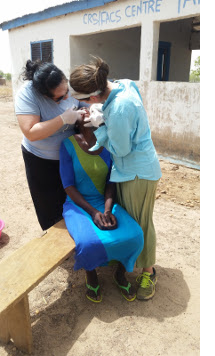Laura Kaufman, MD: Greater Lawrence Family Medicine PGY2
Ghana: March 2018

“How long has he been unable to walk?” I asked the son of the patient seated in front of me. We were in a hot clinic room within the rural hospital in Nalerigu, Northern Ghana, which these two men had traveled over an hour to reach. He had no diagnosed medical history but mentioned trouble breathing for years, and his oxygen saturation was in the 70s! How was he sitting here talking to me? I was only two days into my medical mission trip to Ghana and suddenly became nervous that I would never figure out this man’s story without my familiar first-world tools.
It had been a busy morning. After rounding on the pediatrics ward – seeing children mostly for malnutrition, dehydration, or unexplained fevers often treated as typhoid - we had rushed to clinic, walking past the scores of patients lying in the open-air hallways outside our exam rooms, hoping to be seen sometime before nightfall.
We eventually treated my patient for severe COPD as a working diagnosis, and the next time I checked on him he was so grateful! He was still very weak, but for the first time he felt a bit better. I took the small victory, but quickly became dejected as it became clear that the real treatment he needed was long-term home oxygen, an impossible order in our setting.
During my three weeks in Ghana I developed a deep respect for the missionaries and local doctors who do this work every day. I felt grateful to experience a totally foreign culture and serve people in the greatest need. But I also learned that despite our best efforts, medicine has unfair limits, whether you’re in a hospital outside of Boston wishing an MRI can come faster or in a hot corner of Ghana wondering why a baby has a fever.
While we did not transform the lives of everyone in Nalerigu, through compassion and a little effort from everyone, I think we made a difference. I hope to continue global health work throughout my career, seeking to bring a small breath of fresh air to people in need wherever they can be found.